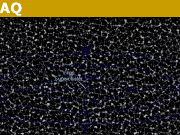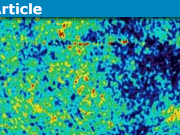Is the Universe a Black Hole?
In the early universe, the matter was gathered together at very high density, so why wasn’t it a black hole?
The first thing to understand is that the Big Bang was not an explosion that happened in one place in a preexisting, space. The Big Bang happened everywhere at once, so no location would be the place where we would expect a black hole’s singularity to form. Cosmological models are either exactly or approximately homogeneous. In a homogeneous cosmology, symmetry guarantees that tidal forces vanish everywhere and that any observer at rest relative to the average motion of matter will measure zero gravitational fields. Based on these considerations, it’s a little surprising that the universe ever developed any structure at all. The only kind of collapse that can occur in a purely homogeneous model is the re-collapse of the entire universe in a “Big Crunch,” and this happens only for matter densities and values of the cosmological constant that are different from what we observe.
A black hole is defined as a region of space from which light rays can’t escape to infinity. “To infinity” can be defined in a formal mathematical way,[HE] but this definition requires the assumption that spacetime is asymptotically flat. To see why this is required, imagine a black hole in a universe that is spatially closed. Such a cosmology is spatially finite, so there is no sensible way to define what is meant by escaping “to infinity.” In cases of actual astrophysical interest, such as Cygnus X-1 and Sagittarius A*, the black hole is surrounded by a fairly large region of fairly empty interstellar space, so even though our universe isn’t asymptotically flat, we can still use a portion of an infinite and asymptotically flat spacetime as an approximate description of that region. But if one wants to ask whether the entire universe is a black hole, or could have become a black hole, then there is no way to even approximately talk about asymptotic flatness, so the standard definition of a black hole doesn’t even give a yes-no answer. It’s like asking whether Beauty is a U.S. citizen; Beauty isn’t a person and wasn’t born, so we can’t decide whether Beauty was born in the U.S.
Black holes can be classified, and we know, based on something called a no-hair theorem, that all static black holes fall within a family of solutions to the Einstein field equations called Kerr-Newman black holes. (Non-static black holes settle down quickly to become static black holes.) Kerr-Newman black holes have a singularity at the center, are surrounded by a vacuum, and have nonzero tidal forces everywhere. The singularity is a point at which the world lines only extend a finite amount of time into the future. In our universe, we observe that space is not a vacuum, and tidal forces are nearly zero on cosmological distance scales (because the universe is homogeneous on these scales). Although cosmological models do have a Big Bang singularity in them, it is not a singularity into which future world lines terminate in finite time, it’s a singularity from which world lines emerged at a finite time in the past.
A more detailed and technical discussion is given in [Gibbs]. [HE] Hawking and Ellis, The large-scale structure of spacetime, p. 315. [Gibbs] http://math.ucr.edu/home/baez/physics/Relativity/BlackHoles/universe.html
The following forum members have contributed to this FAQ: bcrowell, George Jones, jim mcnamara, marcus, PAllen, tiny-tim, vela
This article was authored by several Physics Forums members with PhDs in physics or mathematics.








Would it be possible for someone to clarify that sentence?
I thought the singularity was where world-lines finished and that they only extend a finite amount of time into the future from the event horizon before reaching the singularity?This is correct, and I think it is the same thing that the article was trying to say (though the wording was apparently somewhat confusing).
Nice summary, and it's something I'd like to point people at when this question comes up in other forums. Before doing that, can I just check one point which surprises me, I think I'm mis-reading it perhaps:
I thought the singularity was where world-lines finished and that they only extend a finite amount of time into the future from the event horizon before reaching the singularity? Some clarification would help me here.
https://www.physicsforums.com/insights/universe-black-hole/
Here is a paper on this subject I wrote for Am. J. Phys. some years ago: http://users.etown.edu/s/STUCKEYM/AJP1994.pdf
Good reading. I have a thread
https://www.physicsforums.com/threads/big-bang-vs-black-hole.827828/
Which was already closed.
I've previously requested that Greg stop recycling my old posts as Insights blog posts. It suggests that I'm interested in the Insights blog, which I'm not. Also, it makes me feel as though I'm obliged to respond to a flurry of new discussion on some post that I wrote years ago and that was discussed then. Although this post has multiple authors, I basically wrote it. I've repeated my request to Greg that he stop doing this.
This is a great article! You 6 are approaching my theory.Once it is recognized (which you are approaching) that a "black hole" is only a concentrated ZPE area of the fundamental field seen in a galaxy as a "potential of negative matter" (anti-matter) to compensate for the surrounding ordinary matter and that in an area of relatively low density of space matter, it is apparently there doing the same thing, we approach my theory, which is very similar to what Bohm speaks of. As far as a "beginning" everywhere at once coming in view matter; that is an improvement on the standard BBT. But necessary only for those needing a beginning of time. It is quite obvious to many that the attribution of "expansion" of space falls out of only one interpretation of Hubble's data, which ignores Hubble's lack of acceptance, and Fritz Zwicky's and would be quite unnecessary if we could demonstrate objectively how a photon loses frequency when traveling great distances. Does anyone with a reasoning brain expect a photon to cross the universe (unimpeded) to not lose energy in its travels?B